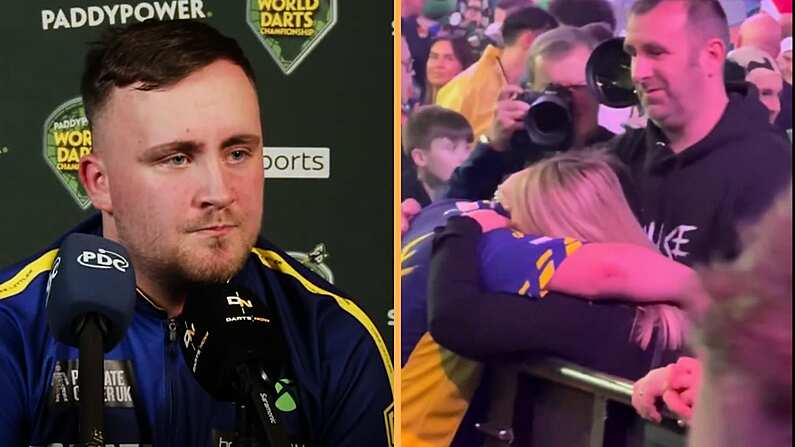Sometimes, the mind's construction is evident in the face.
Paul Stewart's visage is weary, bearing contours deep and incongruous for a man of 53: the legacy of bearing decades of mental anguish. But more revealing are the pair of coruscating, azure eyes corralled by the sunken skin. They burn brightly as a kind of bulwark against the suffering and the cruelty, emblematic of vestigial, uncorrupted strength.
"I've always been a fighter", Stewart tells Balls, "and that's why I've not ended it all".
A year ago, Paul Stewart revealed to the world the kernel of more than 40 years of torment. At the age of 11, he was sexually and physically abused by his football coach Frank Roper. It lasted every day for four years. Its aftermath would lead him to suffer from outbursts of anger and depression, triggered by a dependency on alcohol and cocaine which wreaked destruction on his family life, stripping him of the ability to trust people to the extent he cannot tell his wife and children that he loves them. He battles depression today.
And yet.
From turmoil he forged a successful football career with Man City, Spurs, Liverpool and others, in which he won the FA Cup, international recognition, and countless friends and admirers. But above all, he is still here to tell the story which has corrupted him, in the hope that it will help others.
Having read the story of Andy Woodward, the first man to come forward to reveal he had been sexually abused by a football coach last year, Stewart was inspired to tell the Daily Mirror's Jeremy Armstrong of his abuse. Now, Stewart and Armstrong have written a book.
There was never going to be a book about my playing career, it didn't really warrant a memoir. If I had written a book about my football career, I wouldn't have bought it. But all that changed last November [after going public on his abuse]. I was approached by a number of publishers.
I thought long and hard, as what I wanted to tell them was that I would write the truth as it is. Obviously, football is in there as it was twenty-odd years of my life. But I don't see it as an autobiography, but more of a life-story, from the start of the abuse to the struggles with drink, drugs, and depression. Along the way, somehow, I managed to have a football career.
I didn't write it for myself, I wrote it for others.
The book is called Damaged. The title was carefully chosen.
*****
The book is a devastating account of abuse and its residual trauma but is also a brutal, unflinching testimony to Stewart's remarkable bravery and strength of character.
Growing up, Stewart harboured a common dream, but it was to be his tragedy that Frank Roper would take possession of it. Roper scouted and coached Stewart for an under-11 side called Nova Juniors, which would be step up in quality, representative of the right kind of trajectory for a kid eager to make a career out of the game.
Roper had sinister motives, and soon began physically and sexually abusing Stewart. When describing the abuse in the book, Stewart opens with Roper's refrain, "What I say, you do". Roper deceived Stewart's family by shrouding his depraved behaviour as the benevolent offering of extra training, necessary for a young player to make it in the senior ranks. He would call by Stewart's home - even once doing so on Christmas Day - along with picking him up from school and organising football tournaments abroad in Ireland and America, setting them up in such a way that he would stay in the same room as Stewart.
In order to conceal the abuse, Roper threatened Stewart that he would kill his brothers and parents were they to find out. He also made concerted efforts to turn Stewart against his own family, citing his shabby dress and hand-me-downs as evidence that they did not love him.
We use the word grooming now, but there was no such word as grooming in society back then. You had this football coach promising to make me a great player. We were a relatively poor family, and he was lavishing gifts on my mother and father. The only pair of boots I had were third-hand down from my brothers, and he gave me brand new football boots.
The abuse escalated from there, and I had nowhere to turn. If I told my Dad, he would have done something and ended up in prison. He threatened to kill my parents and my brothers. I felt that he had the power to give me a career or take it away.
Stewart only told his parents of the abuse days before going public with the Mirror, and every day since has been a conscious effort to disabuse them of any feelings of guilt. "What was the most worrying part of all this was that they felt it was their fault. But we were all groomed. I was the one who was abused, but he groomed us all. My parents thought he was helping my football career. My brother thought I was off training with the lads when he brought me off. The important thing was they didn't feel guilty for what happened, as it was not their fault. Becuase it was nobody's fault but his". His mother admits in the book that she has struggled to sleep ever since.
Stewart's response to the abuse was to withdraw, becoming terribly isolated. He would kick a ball against a wall alone in school during lunch break, and spent a year virtually mute.
If somebody asked me something, I would give them a short, one-word answer, but I would never engage with them. I was living in fear. He was around all of the time, I was worried I'd get beaten up for saying something I shouldn't.
I thought it better not to say anything. He had me exactly where he wanted me.
At the age of 15, Stewart finally broke free of Roper, rebelling by shoving away his advances and sprinting home.
But the legacy of the abuse lingered corrosively.
As it did so, Stewart fulfilled a very impressive career. He got his break at Blackpool, and from there bagged a move closer to home with Manchester City, whose secluded training ground was often a location for Roper's abuse. Yet in the shadow of it all, he continued to make a name for himself as a forward, and after a year with City, he earned a move to Terry Venables' Spurs. It was here that his playing career hit its zenith.
Stewart burnished his medal collection from a successful FA Cup final in 1991 with the Man of the Match award. When playing football, Stewart says, he "felt like I could be myself without thinking about what I should be doing".
But still, the shadow loomed.
His anger would frequently boil over, and he collected cards prodigiously: suspensions meant he had to wait three months to make his Tottenham debut in 1988. Off the field, his behaviour was even more self-destructive.
I knew I had a problem, but I thought I had locked it away and was getting on with life. Unfortunately, I hadn't, and it manifested itself in other ways. When I took my first line of cocaine, I thought I had found the solution to all of my troubles... but the lows were worse and worse. When I was high I had forgotten everything and felt invincible, but when I came down I'd want to top myself.
I'd go out and not come home for five days. The damage on my children as they were growing up, and on my wife mentally, was so wrong. It was doing me no good, but it was the effect on everyone else around me that was the greater issue.
Stewart found himself in some dark places. "There have been so many times, because of the heartache I was heaping on other people, that I've thought it would be much better if I wasn't around at all", says Stewart plaintively. "But I didn't do it". Instead, he twice went cold turkey at home without ever telling his wife the extent of his problems, locking himself in the spare bedroom for days to sweat through his own, personal hell.
*****
If it seems surprising that Stewart would battle a drug addiction without telling his wife the full extent of the problem, it is symptomatic of one of the biggest damages of the abuse. "What gets stripped from you is your self-confidence. Emotions that you would usually have growing up are taken away from you. You're always worried that someone will let you down, you don't have trust for anyone. Even your own children and wife". Stewart still struggles to this day to articulate his affections for his wife and children.
Am I able to show my affection to my wife and my children now? No, I'm not.
I still struggle daily with that. I just don't do that. I have a granddaughter who is eight months old, and I'm able to tell her that I love her, as she can't speak. I'm determined to carry that on as she grows up, but will I be able to? Only time will tell.
I struggle with that. And hugging...I don't do that.
I ask him if he thinks he has been a bad father. "Yeah. Very guilty. I put their lives through hell at times with my actions."
What follows is the insight into Stewart's current struggle. When a life story is presented in a book, neatly told between covers front and back, it is tempting to assume that the story told is finished. In this case, it is not.
I've struggled with it for 43 years now, so I'm not able to flick a switch after 12 months and it go away. I still deal with it on a daily, weekly, monthly basis. Some days are better than others. I'm not naive enough to think I can flick a switch and see it go away. Not after 43 years.
What I do say is I can't change that past. What I can try to do is to change the future. I am trying to be a better Dad. That's all I can do, and I am trying to make amends with my family. I have to admit that there's not a magic switch there that Paul Stewart can all of a sudden become a different Paul Stewart... I've been like this for 43 years.
Stewart's going public triggered a worldwide search for Roper, ending with the revelation that the abuser died in 2005. Learning this, says Stewart, changed nothing for him. "Revenge was not my reason for coming forward. Revenge is very dangerous, it can put you in dark places. My focus remained the same. It wasn't the same for my wife and children, they wanted to see him brought to justice. It was devastating for them. I felt that, if I let it affect me, he would still have a hold over me. And I'm not going to let that happen".
The past is lost; the future is worth fighting for.
*****
Stewart knew that Roper was a serial abuser, but he did not imagine the scale of child abuse within the game. In the year after Andy Woodward became the first to come forward, 748 victims have come forward to the police. The FA's chairman Greg Clarke has described it as the biggest crisis in the FA's history, with the Sheldon report into the scandal due to be delivered next Easter. In the past year, however, the FA have shambled between a series of self-made crises, the largest being their shocking mishandling of the Eni Aluko case.
Clarke personally assured Stewart he would not let him down in investigating the culture and improving the safeguards in place, but remarkably, the FA did not contact Stewart upon the publication of his story. Once Stewart had publicly claimed the FA had their heads in the sand, however, he was whisked to Wembley for a meeting. Whether Stewart trusts the Association to deliver on their promises is not the issue here, as he simply won't allow them to fail.
You have to question whether the right people are in charge. They seem to be really, really clever at making fuck-ups. Sorry to use that language, but that's what they are experts at.
The way I see it, I'm going to pressure them to deliver on what we want to deliver on. They are very frightened that we might come out and say anything about them not delivering, so we have got them in a situation where we can say that they're not delivering.
They want you to go out and say how well they are doing, and they have done an awful lot surrounding safeguarding, but I'm not one of those people to say 'well done to the FA'.
If I don't think they are doing it, I'll be the first to say that they're not.
As more of these horrific tales come into the public eye, we speak about the media's responsibility in covering the stories. He talks about his own experience, and praises Armstrong and the Daily Mirror for how they treated his story, citing their interest in him rather than the headlines. He is critical of many outlets in the aftermath of the story breaking, however, as they "just wanted the scoop". "ITV would say to me don't talk to BBC, BBC would be saying not to talk to whoever. I had to look at that and decide whether I accept it, or tell them where to go. But I asked myself, why did I initially choose to do this? It was to tell my story. So I used them as much as they used me".
Toward the end of the interview, I dredge up a sickening irony that appears in the book. He appeared on an episode of Jim'll Fix It, in which his Manchester boys' team were given a game against the Manchester United first team. After the revelations about Jimmy Saville entered the public domain, Stewart got a few wry messages from friends of how he had a "lucky escape", without knowing the truth of Stewart's past.
Why did he include it in the book?
Yeah....ironic isn't it? Manchester Boys set it up. The captain wrote to him to ask if we could play against Man United. I put it in the book because it was so ironic that I was on that show, you wouldn't make up that story.
But it shows you what society was like. He [Saville] was getting away with what he did because people tended to believe adults, and not children. Society was that children should be seen and not heard.
If ever a child did speak up, they would tend to believe the adult. Society is different now, and children are more aware of themselves, but we cannot get complacent. Every single thing we can do to eradicate this, we must do it.
Paul Stewart has endured unimaginable torment for more than forty years, and he will continue to battle it for each of his remaining days. But for as long as there is life behind those striking blue eyes, he will continue to fight.
Damaged...but not Broken.
Paul Stewart has set up Safeguarding and Victim Engagement (SAVE) along with fellow abuse survivors Ian Ackley, David White, and Derek Bell to help anyone affected by these issues. They can be found at saveassociation.com.
Damaged by Paul Stewart with Jeremy Armstrong is published by SportMedia and is available now.
The author of this piece can be contacted at [email protected].











